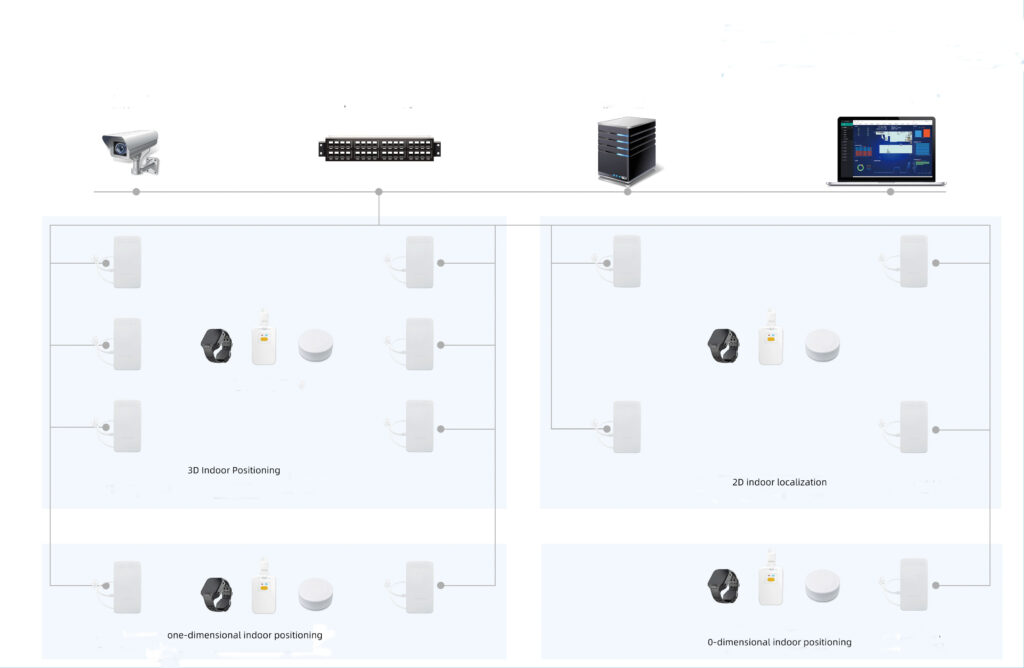Ultra Wideband (UWB) technology is a new wireless technology emerging in recent years, which is very different from the traditional communication technology. It is very different from the traditional communication technology.UWB technology has high transmission rate, low transmit power and high penetration capability. It is a wireless technology based on very narrow pulse.
UWB positioning technology is capable of realizing different positioning business requirements in different environments. It includes 3D/2D/1D/regional fine positioning of people, vehicles, and assets. It can also realize trajectory tracking, area alarm, camera linkage and other functions.

UWB 0-dimensional indoor localization is commonly used for presence detection. It can monitor whether a person is in a room for a long time. 0-dimensional indoor positioning system only needs a UWB base station and UWB tags can be realized. the UWB tags and base stations communicate with each other. It realizes the functions of presence monitoring and alarming of personnel through the system.
The principle of UWB one-dimensional positioning application is ranging application. It can know the relative position of the positioning target label. the UWB accuracy is about 0.3 meters. It is suitable for tunnels, pipes, tube wells, mines and other scenarios.
UWB 2D localization requires determining the X/Y coordinates in space. One is to calculate the position of the tag through the distance of the tag from the base station. Another kind is to determine the position of the tag in the area by more than three base stations. It can accurately know the location and behavioral trajectory of the target tag.
UWB 3D positioning requires knowing the XYZ 3D coordinates of the positioning device. In the base station architecture, it is necessary to pull the height difference of Z-axis to ensure the accuracy in Z-axis. If using the ranging method, three base stations can complete the 3D positioning. With TDOA, more than four base stations are necessary to accomplish it. It can accurately determine the label position, as well as the retention time.
UWB positioning system is roughly divided into location sensing layer, network transmission layer and positioning application layer. It mainly includes the following product hardware.
(1) Positioning engine server
(2) Intelligent terminal
(3) POE switches
(4) UWB base station
(5) UWB tags
(6) UWB module
(7) Software interface
(1) Each localization tag sends data frames in UWB pulses repeatedly without interruption.
(2) The UWB pulse string sent by the positioning tag is received by the positioning base station.
(3) Each positioning base station measures the time it takes for each tag's data frame to reach the receiver antenna.
(4) The localization engine determines the time difference between the tags reaching different localization base stations. It also uses three-point positioning technique and optimization algorithm to calculate the tag position.
(5) It uses multi-base station positioning mostly using TDOA algorithm.
(1) UWB base station is divided into two ways: wall installation and column installation.
(2) It is recommended to choose an indoor environment smaller than 50*50 (m). If the indoor environment is obscured, it is recommended to reduce the spacing.
(3) The recommended mounting height of the UWB base station is 2 meters. It is sufficient that it is higher than the height of the people or assets to be located.
(4) The UWB antenna is at least greater than 15 centimeters from the wall. There should be no obstruction around it.
UWB real-time tracking of assets and inventory. She can facilitate the improvement of processes, increase the efficiency of the search and reduce the waste of resources.
UWB tracks barcode readers and forklifts. She reduces insurance checks and makes warehouse management flexible.
UWB realizes personnel positioning and equipment tracking. Examples include urban combat training, ammunition warehouse management, and advanced research and development.
UWB tracks hospital patients in real time for care and management. It facilitates condition analysis and treatment improvement, and facilitates human resource management.
UWB can realize the fire scene personnel positioning individual. It can facilitate emergency search of personnel, personnel monitoring.
UWB can realize the entry and exit management of personnel at the exhibition site. It can also real-time location query, exclusion zone supervision, and travel route for monitoring.
UWB can track and calculate the direction and speed of athletes in real time, etc.. It can carry out detailed performance analysis and record the team's game reality.
Prev:Application of Bluetooth Beacon in Factory Personnel Location
Next:Bluetooth Beacon Parking Lot Reverse Vehicle Locating Solution
Copyrights© Shenzhen Skylab Co.,LTD All Rights Reserved.

